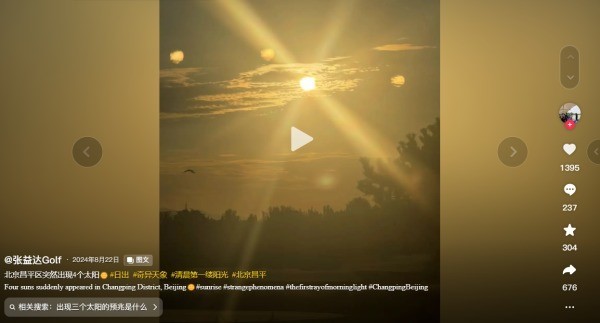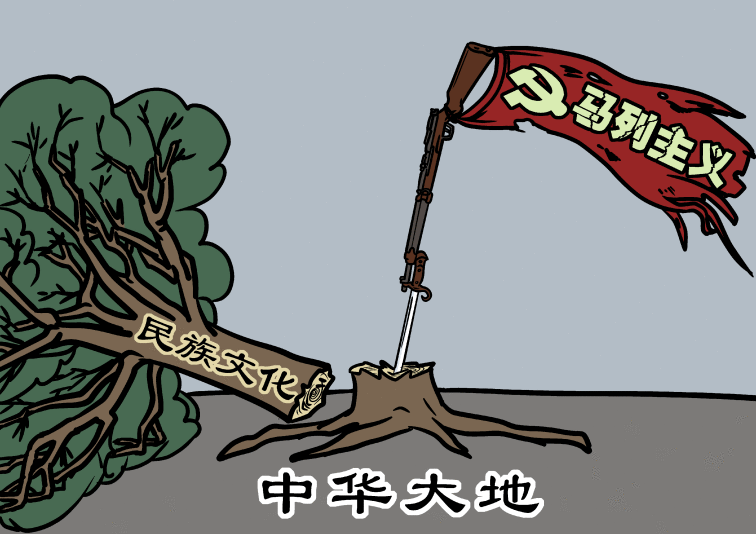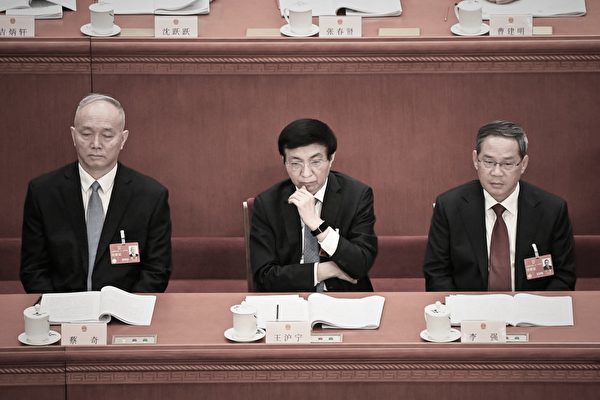Composite image: Hu Chunhua and Wang Yang are rumored to become successors.
[People News] In July of last year, following the Third Plenary Session of the 20th National Congress of the Communist Party of China, rumours regarding Xi Jinping's diminishing power gained significant traction both at home and abroad. However, just as the authenticity of these reports was being debated, a startling revelation surfaced from within the Communist Party: the retired former member of the Politburo Standing Committee, Wang Yang, is poised to make a comeback and take over as General Secretary of the Central Committee! There are even reports suggesting that Wang Yang has already begun to exercise the powers of General Secretary in an acting capacity.
Even more remarkable, a high monk from Mount Jiuhua in China had prophesied as early as 1997: "Those born in the Year of the Sheep will witness the fall of the Communist Party." Wang Yang, born on March 5, 1955, fits the description of someone born in the Year of the Sheep.
Confusing Ziyang with Wang Yang? The Monk's Prophecy Frightens Jiang
After Deng Xiaoping's death in 1997, Jiang Zemin made a secret visit to Mount Jiuhua, seeking to have a certain high monk evaluate his imperial fortune and the fate of the Communist regime. To his surprise, the monk remained silent for an extended period, and after Jiang's repeated inquiries, he finally spoke six words: "Those born in the Year of the Sheep will witness the fall of the Communist Party."
Jiang Zemin was taken aback. "Those born in the Year of the Sheep? Zhao Ziyang, born in 1919 (Earth Sheep)!" Upon returning to Beijing, Jiang immediately escalated Zhao Ziyang's house arrest, ordering that Zhao not be permitted to leave Beijing. He could play golf, but only within the city; Jiang also ordered the secret installation of a barbed wire fence at Zhao Ziyang's residence at No. 6 Fuqiang Hutong in Beijing, increasing armed police presence for security, and secretly monitoring his phone calls.
As the saying goes, 'Man's calculations are not as good as Heaven's calculations.' At that time, Zhao Ziyang was already in his advanced years, and his health was deteriorating; he passed away seven years later. It was only then that Jiang Zemin realised that the so-called 'people born in the Year of the Sheep' might refer to someone else, leading him to feel that he had wasted considerable effort.
With a striking statement, Wang Yang had already begun to emerge as a 'person who will bring about the end of the Communist Party.'
Overseas author Yuan Bin published an article in The Epoch Times on June 7, noting:
Unlike former Chinese Premier Li Keqiang, Wang Yang did not attend university and instead rose through the ranks from the grassroots level.
In 1979, following the Cultural Revolution, the Chinese Communist Party promoted a significant number of young cadres to take over leadership roles, and Wang Yang, then a grassroots official, was fortunate to be on this fast track. Subsequently, leveraging the momentum of reform and opening up, he quickly established a reputation within the system with his bold ideas.
In 1982, at just 26 years old, Wang Yang became the deputy secretary of the Youth League Committee in Su County, Anhui Province. By 28, he was the deputy secretary of the Youth League Committee of Anhui Province, and at 33, he became the mayor of Tongling City, Anhui Province.
A notable characteristic of Wang Yang's early political career is his willingness to take risks and his courage to implement reforms—not minor adjustments, but significant and sweeping changes.
In 1988, at the age of 33, Wang Yang became the mayor of Tongling City, making him the youngest mayor in China at that time. During his four years in Tongling, he was the first to 'break the three irons': dismantling the 'iron rice bowl, iron chair, and iron salary,' and taking decisive action against the old system in the region.
In 1991, Wang Yang published a lengthy article titled "Wake Up, Tongling!" in a local newspaper, emphasizing that "history does not allow us to sleep soundly on a planned economy." He called for a liberation of thought to dismantle the labels of 'capitalist' and 'socialist.' Wang Yang's initiatives in Tongling also drew the attention of Deng Xiaoping, who was later praised in an article by the People's Daily for the "reform in Tongling."
In the spring of 1992, during his southern tour, Deng Xiaoping passed through Bengbu in Anhui and specifically summoned Wang Yang to the Reception Hall. Reports suggest that Deng admired Wang's reformist zeal and regarded him as a promising talent. Due to Wang's youthful appearance, Deng humorously dubbed him the "Baby Mayor." The following year, at just 38 years old, Wang Yang became the youngest vice governor in the country at that time. It is rumored that Deng Xiaoping entrusted Wang Yang to Hu Jintao, marking the beginning of Wang's rapid ascent in politics.
Throughout Wang Yang's political journey, he has consistently engaged in actions that defy the conventional practices of the Chinese Communist Party (CCP).
In Chongqing, he broke new ground by encouraging readers to "find Wang Yang on page two," thereby altering the traditional media practice of reserving front-page headlines for leaders. He opted for a non-confrontational approach, peacefully resolving the issue of Chongqing's "most stubborn nail household," which garnered significant attention.
After assuming leadership in Guangdong, Wang Yang launched a new wave of "liberation of thought," distancing himself from Jiang Zemin's "Three Represents" and introducing the "cage for birds" strategy aimed at promoting industrial and labor transformation.
In tandem with economic reforms, he also dismissed numerous corrupt officials affiliated with the Jiang faction, investigating figures such as Chen Shaoki, Chairman of the Guangdong Provincial Political Consultative Conference, Wang Huayuan, Secretary of the Provincial Discipline Inspection Commission, and Xu Zongheng, Mayor of Shenzhen. These actions triggered a significant upheaval in Guangdong's political landscape and provoked the ire of Jiang Zemin.
The 'Cage for Birds' model promoted by him in Guangdong sharply contrasts with Bo Xilai's 'Red Singing and Black Fighting' Chongqing model, which was suppressed with the backing of Hu Jintao and Wen Jiabao at the time. The most notable conflict between Wang Yang and Bo Xilai revolved around the 'cake theory', where the red-singing Bo Xilai advocated for the equal distribution of wealth, while the proponent of a free economy, Wang Yang, argued for first expanding the cake.
In addressing the 'Wukan Incident', Wang Yang not only refrained from using violence but also allowed the villagers of Wukan to elect their own village leaders, earning widespread acclaim from both domestic and international media.
Wang Yang also eased restrictions on non-governmental organizations, leading to the emergence of numerous local civil societies. He even piloted the 'official property declaration' system, which struck a sensitive chord among officials at all levels of the Communist Party.
Notably, during his work report at the 11th Party Congress of Guangdong Province in 2012, Wang Yang made a striking statement: 'We must eliminate the mistaken belief that the happiness of the people is a gift from the Party and the government, and effectively protect and harness the initiative and creativity of the masses in building a happy Guangdong. We should respect the people's initiative and allow them to boldly explore their own paths to happiness; only then can we enhance social happiness.'
This statement, 'eliminating the mistaken belief that the happiness of the people is a gift from the Party and the government', quickly gained traction online after being reported by journalists, and within less than a day, it had been reported or shared over 60,000 times.
Since the establishment of the Communist Party of China (CPC), the party has consistently used propaganda to brainwash the populace with slogans such as 'The Party and government bring happiness to the people' and 'Without the Communist Party, there would be no New China.' Wang Yang's statements have dramatically disrupted the official narrative, akin to throwing a bombshell into the mix. It is noteworthy that no previous high-ranking CPC official has made remarks of this nature, highlighting the profound impact this could have on both the CPC's internal dynamics and society at large.
Yuan Bin summarized this by noting that while both Wang Yang and Li Keqiang are typically viewed as reformists within the CPC, Wang has ideologically advanced further than Li. His beliefs are less aligned with Deng Xiaoping's thoughts and more in line with those of Hu Yaobang and Zhao Ziyang; thus, it is more accurate to label him as a liberal rather than merely a reformist.
Conclusion
Currently, whether through internal leaks from the CPC or prophecies from high monks at Jiuhua Mountain made over twenty years ago, all signs seem to converge on one individual—Wang Yang!
At this moment, Xi Jinping, dubbed the 'accelerator of the Communist Party's demise,' has brought the CPC to the brink of destruction, with one foot precariously hanging over the edge. Zhang Youxia, described as a 'military man with a bow,' successfully overthrew Xi during the 20th National Congress and the Third Plenary Session, thereby fulfilling their historical mission.
Is Wang Yang truly the 'last straw' that will break the camel's back for the CPC—the 'Year of the Sheep' born to bring about the end of the Communist Party?
Let us wait and see! △









News magazine bootstrap themes!
I like this themes, fast loading and look profesional
Thank you Carlos!
You're welcome!
Please support me with give positive rating!
Yes Sure!